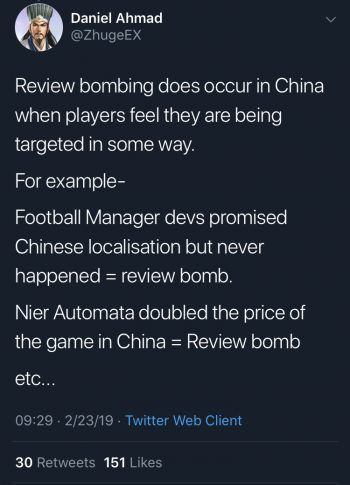When my mother told me not to believe everything I read online, I never knew how right she would be. On a wide scale, review bombing has become an internet phenomenon that is intended to passively attack a particular company or organization through the use of user-submitted feedback on websites like Metacritic, Steam, Rotten Tomatoes, and more. This is often in retaliation to certain changes or alterations on a particular form of media that goes against the fandom, though this is not always the case. Review bombing has become a way for angry fans to vent their frustrations online and, albeit somewhat creative, it may have a wide range of repercussions on the future of how we give feedback on the internet. With greedy publishers on one side of the ring and an angry community of gamer fans on the other, it’s poised to be an interesting showdown, but in the end who really wins?
Review bombing can be identified by a mass quantity of negative reviews in a short time frame. Thus, the game’s overall rating plummets and deters gamers from playing, which they theorize means less money for the publisher, but bad sales and review bombing have not been linked. This phenomenon is not limited to the gaming industry, it has seeped into film reviews as well. MCU fans will remember the review bombing of Captain Marvel, which led Rotten Tomatoes to wipe over 50,000 negative reviews from its site. And recently, when Gearbox announced Borderlands 3 will be a six-month timed exclusive on the Epic Games Store, Borderlands 1 and 2 were caught in the mix and even tested Steam's prevention system. This internet trend has now made online reviews themselves a thing of the past.
[caption id="attachment_437424" align="alignnone" width="590"]
 Via Twitter[/caption]
Via Twitter[/caption]
 Via Twitter[/caption]
Via Twitter[/caption]
History Of Review Bombs
Despite it feeling more like a recent occurrence, the first example of review bombing can be traced all the way back to 2011, when CBS-owned review aggregator Metacritic faced a barrage of angry gamer backlash in retaliation to the site’s poor moderation over user-submitted reviews. Attacking Bastion, Toy Soldiers: Cold War, and others, review bombers intended to use the system against them in the hopes that a form of change would come about. This soon blossomed into a destructive weapon, one that would make all users rethink how they read into online feedback, and how others could use it to their advantage. While the Metacritic debacle may have made the site rethink its user review policies, the only real change that came about was tactics in review bombing itself. It grew into a gaming phenomenon. With Mass Effect 3’s ending receiving a multitude of backlash in 2013, followed by Titan Souls over a squabble between a YouTuber and developer, this form of internet activism developed into a way for gamers to strike back at the rule-makers, yet so far to no avail... Until Bethesda and Valve witnessed their fair share in 2015. Pissed off over Valve’s introduction of paid mods in Skyrim, a bevy of Steam users went to work tarnishing not only Skyrim’s reviews, but also many paid mod bundles, as well. Valve eventually consented and eliminated paid mods from the game, but it wouldn’t be the last time Bethesda was harassed with angry reviews over modding. Even the prized Grand Theft Auto V by Rockstar was hit with review bombs in 2017, thanks to a cease-and-desist against OpenIV, a modification tool. At the time, Take-Two Interactive, Rockstar’s parent company, was directly targeting the modding community, which was altering data in both single and multiplayer modes. With the rise of GTA Online as one of the most profitable endeavors in the entertainment industry, it’s no wonder they were protective, though they had no idea what they were up against.
[caption id="attachment_437439" align="alignnone" width="350"]
 Via Twitter[/caption]
Via Twitter[/caption]
 Via Twitter[/caption]
Via Twitter[/caption]
Target Companies, Not Games
There is also variety in review bombing, as history proves. Review bombing in China is used to fight back against particular policies implemented by companies and the government. In the United States, review bombing does often target capitalism, which is an issue plaguing the video game industry, so there is a reason for change. As witnessed in the case of Valve and Bethesda, it’s clear that review bombing works, to some degree, but is it worthwhile? In my opinion, I find that although it is a creative form of free speech on the internet, it only abuses the system and ruins the character of the work in question. Rather than ruin a good game’s score due to complaints, vent them out on Twitter. Even better, don’t buy the game. Armchair activism, in of itself, is a passive form of retaliatory action, so use it to your advantage and get creative. Push the narrative on other social sites, don’t tarnish a game’s reception and reputation over a company’s misdeeds and greed.
Despite its more common name of ‘slactivism,’ armchair activism is actually far more active than people may think. Armchair activism is often defined as an action performed online that targets social change, political reformation, or even corporate injustice. It can be anything from sending a scathing Tweet, to hacking into a government website. Having grown up in the glory days of Anonymous, an online group of unknown hackers who targeted similar concepts, I’ve seen my fair share of this internet phenomenon to know it does get eyes. An audience is necessary, and while I may not believe review bombing itself is worthwhile, I do think certain ideas under armchair activism have set precedents for social change and can be used for good.
While I do think review bombing only downplays how we already perceive the internet, a place full of fallacies and conspiracies, I do think it can incite some form of change. With Valve implementing new tools for erasing and diffusing review bombing on Steam, in addition to even targeting positive review bombs, it’s obvious that above all it is a problem more than it is an answer. The Epic Games Store doesn’t even have user reviews, which says something about the industry as a whole. Greedy corporate practices are to blame, not the video game. Targeting corporations utilizing ideas in armchair activism might bring about swifter results. Going on Twitter, Facebook, Reddit, and YouTube in order to enlighten audiences, rather than destroy a game’s score, is far more meaningful. Voicing opinions in this way will strengthen the argument and rally the community, and doesn’t directly harm the game or media that is in the limelight.
What Does It Do?
So does review bombing do anything? I think more often than not it doesn’t, but it does shed light on the way we experience the internet and how we utilize this tool. People still discuss these events and they rile up the community and stir discussion. They're almost like online protests, though how do we trust user reviews when you can’t trust a single user? The reviews themselves may not be lying, but they are exaggerating their opinion in the hopes of targeting the company. Let's use review bombing for good, instead of retaliating like angry gamers. As more and more tools for their elimination are introduced, review bombs have yet to stop. It will be fascinating to watch how we adjust to this new era of multimedia reception. It’s important to always be wary of what you read, but above all else don’t ever forget to adopt your own opinions on the things you consume daily.


